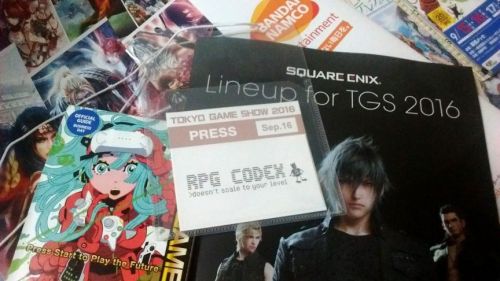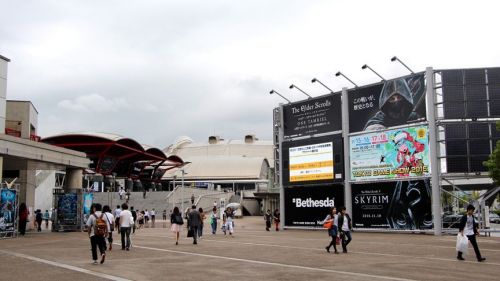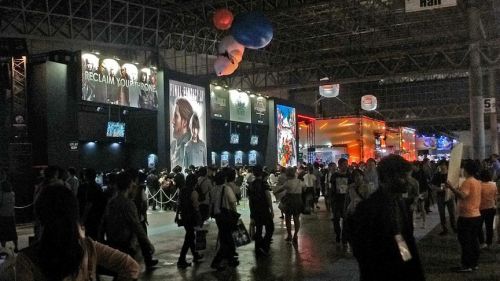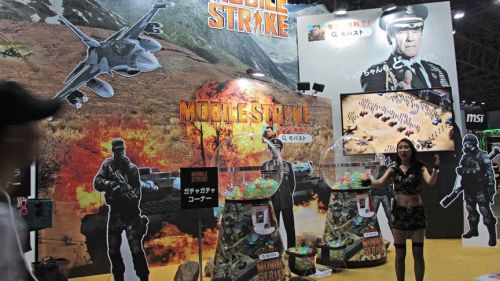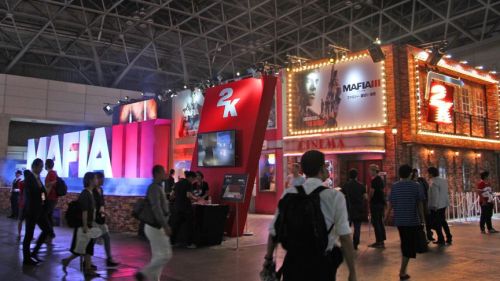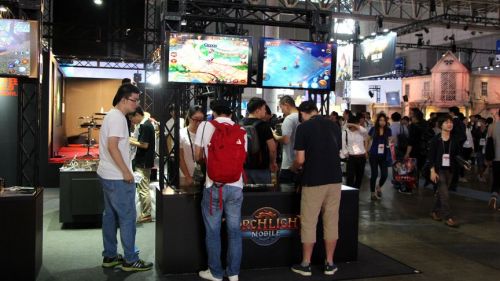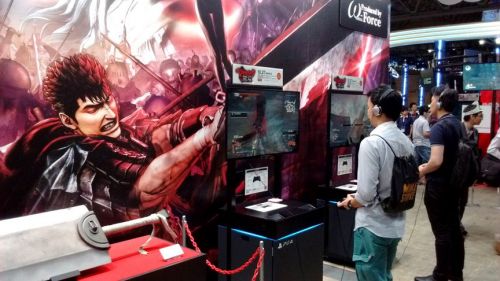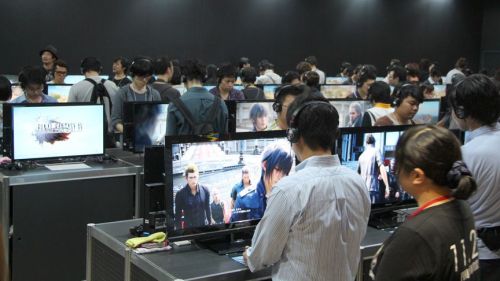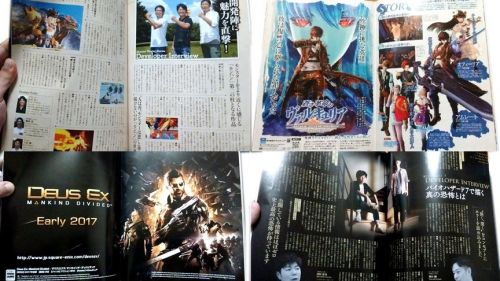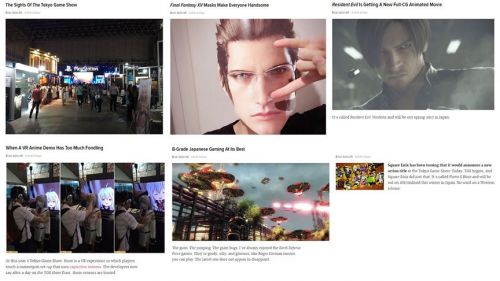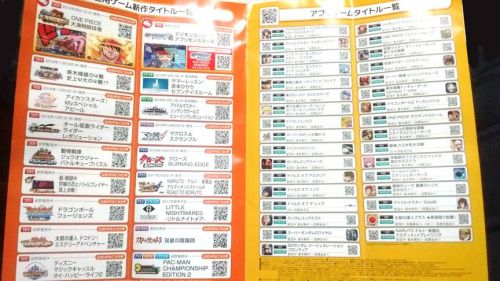RPG Codex Report: Tokyo Game Show 2016
RPG Codex Report: Tokyo Game Show 2016
Editorial - posted by felipepepe on Sat 12 November 2016, 12:50:58
Tags: Japan; TGS; Tokyo Game ShowIt was a dark and stormy night when I saw the Tokyo Game Show 2016 poster and thought - "Hey, I live in Tokyo now, I could go there! Ugh, but I hate waiting in lines and paying for stuff..."
A few weeks later, on September 16, I was disembarking at the Kaihin-Makuhari Station, ready to face TGS' Business Day as a reporter for the prestigious RPG Codex.
As I stood there, an old foe greeted me at the gates:
Bethesda... Not exactly what I expected at TGS, but hey, maybe this means there will be some Western RPGs inside, right?
"Todd Howard will never expect a Codex interview ambush in Japan", I humored myself as I traded my newly-printed RPG Codex Business Card™ for a Press Pass.
TGS has four days - two business days on Thursday and Friday, two public days on Saturday and Sunday. Thursday had some massive lines, but since I'm lazy and only went on Friday, me and my friend just waltzed into a relatively empty TGS:
Eager to comply with my sacred duties, I first checked where the Western RPG devs were. Sure, our friends from Obsidian, InXile and Larian weren't there, but clearly Bethesda was, right? I mean, what kind of Radiant AI would spend a fortune advertising outside, but have nothing to show inside?
This is when things start to get weird. Which you would say are the big Western AAA titles of the past year or so?
Overwatch, Skyrim remaster, Elder Scrolls Online, Hitman, Doom, Dishonored 2, Fallout 4, Ghost Recon, For Honor, Watch Dogs 2, Deus Ex: MD and Rise of the Tomb Raider were all here:
I kid you not - one TV shoved in the back of the Square-Enix booth playing trailers. That TV, plus the little VR booth you see next to it, was Ubisoft, Bethesda, Eidos and Blizzard's place of honor at TGS 2016.
For a sense of how feeble that looks, here's the booth of Mobile Strike, a free-to-play cellphone game with Arnold Schwarzenegger - or Shuwa-chan, as the Japanese call him:
And here's 2K's MASSIVE area dedicated solely to Mafia III:
You could say Western companies don't care about Japan, but Deus Ex, Hitman and Tomb Raider are owned by Square-Enix - and they didn't even bother to release these games in Japan yet.
Yeah, Deus Ex: MD and Hitman are still "coming 2017". More like Japan doesn't care about Western games. The outlier here, 2K, probably learned this the hard way - Mafia III came out in Japan on October 27th, selling only 15k copies in the first week.
Something is wrong
Since Bethesda was just a TV and BioWare, CD Projekt, Obsidian,Larian, etc., were not present, all I had was Torchlight Mobile, a free-to-play entry in the series that sadly seems to be stuck in development hell and plays exactly like you'd expect - footage here if you're interested. But they had TWICE the amount of TVs than Bethesda!
After fulfilling my Codexian duty with this exhaustive coverage of all WRPGs present, I moved on to personal preferences.
The game I was most excited about was Berserk Musou. I've been a Dynasty Warriors fanboy since DW3 and have been following Kentaro Miura's manga for over a decade. The game had several teaser trailers, but not a good gameplay look, so I was curious to try it.
And indeed, there was a nice booth, complete with Gut's sword:
After watching it for a while, I thought what I could write for the Codex about it - that it seems to make perfect sense when you're fighting alongside Griffith and the Band of the Hawk, slaying generals and capturing key points in large army battles... but it just looks lazy later when you're the Black Swordsman, alone in a small area, running around doing "objectives".
However, when I arrived home later, there was already an extensive gameplay video showing way more than I had the chance to see. Hmmm.
So, apart from holding the controller for a few short minutes (and pressing [] repeatedly), someone who stayed home could've experienced much more than those who were there. And that's really the feeling that best describes my experience as a "reporter" at the Tokyo Game Show...
The (lack of) highlights
This is why this article took so long to be written. Real talk - what were the highlights of TGS 2016?
Ni-Oh? Valkyria: Azure Revolution? Monster Hunter Stories? Resident Evil 7? Yakuza 6? FFXV?
All previously known titles, that had extensive coverage and even demos (at least in Japan) way before TGS.
Hell, the Square-Enix booth was mostly just a giant demo-playing area. FFXV had a 1-hour waiting time so you could play a bit of the first 15 min. Considering all the demos and that there's a 1-hour gameplay video of that same section out there, why bother?
Notice how most of them are just watching cutscenes anyway... much demo, very gameplay - wow. (Yes, I still like this meme.)
Persona 5? It was released on the first day of TGS. You could simply go to a store and buy the full game instead.
The (lack of) interviews
Okay, so how about interviews and press conferences then?
Well, unlike Gamescom, where our brave shock troops stormed the booths to talk with devs and get exclusive hands-on and interviews, I had no access whatsoever to developers. No beers with Warhorse Studios' Daniel Vávra, no PvP duels with Larian's CEO Swen Vincke, no Codex drama with inXile...
Sure, there were presentations happening on the TGS floor, like this one with the devs of Valkyria: Azure Revolution:
But they were streamed live as well - and, believe me, watching at home is a lot better than doing so on the show floor. It's not like I could ask questions or anything - "Yo, why the hell is this game real-time? Make Valkyria turn-based again!"
No, on the floor communication was strictly one-way.
TGS did have a convoluted system called "Asia Business Gateway" for arranging individual meetings, where you could contact publishers, indies, tech businessman and other journos, but, as the name implies, it's focused on business meetings - tech, publishing deals, localization, etc... not press coverage.
While the Codex had no problems scoring appointments at Gamescom, in Japan I was either ignored or met with "Silly gaijin, you're not Tier 1. Just play the demo". I did receive some messages, but they were from indies who seemed to be as clueless and gaijin as I - one even asked me if the RPG Codex would be interested in publishing his infinite runner mobile game. (What do you say, DU?)
Sadly, the system is offline now that TGS is over, so I can't take any screenshots of it (or my pathetic attempts at communication).
Even the press kits I received were lame. I was trading super-prestigious RPG Codex business cards (which undoubtedly will one day be worth fortunes) for A4 sheets with download links to generic screenshots and press releases. Three companies took my glorious business card and told me they would e-mail me the press release later, but never did so.
The only interesting things were the magazines they distributed there. Most were just fluff, but some had extensive interviews:
Overall the loot was so boring it felt like I was playing Pillars of Eternity. ˸edgy˸
The (lack of) media coverage
Since I had nothing immediate to report, I decided to take my time and wait to check the TGS coverage on other websites. It was limited, to say the least.
Take Kotaku, for example. For many years they've covered every TGS, usually with Brian Ashcraft doing the reporting. TGS 2014 and 2015 had roughly 20 articles each.
For TGS 2016, Brian Ashcraft wrote 6 articles.
One with just pictures of the event, one about a silly FFXV mask, a trailer of a new Resident Evil CG movie, a report about a "fondling" VR game (actually based on tweets), then articles about the demo of Earth Defense Force 5 and Squeenix's new iOS/Android game called Flame X Blaze:
WOW. Clearly one of the largest and most important gaming events in the world.
So it's not (just) that I'm lazy, there's clearly something going on here. And the answer is obvious:
Online press conferences
Just two days before TGS 2016, Sony held their Playstation Japan Press Conference.
In less than one hour, they summed up pretty much everything PS4/Vita-related that would appear at TGS - new game announcements, new trailers, release dates, etc...
Two weeks earlier, Nintendo had done the same with their Nintendo Direct (which is different for US/EU and Japan). Pokémon Sun & Moon, Monster Hunter Stories, Zelda, RPG Maker, were all there:
Nintendo, who have historically avoided TGS, adopted this elegant Nintendo Direct format in 2011, and it makes perfect sense. Why should they plan their reveals around somebody else's event, competing for attention with all other companies in a short time span, relying on journalists to get interested and report the news... if they can just stream directly to gamers exactly what they want, whenever they want - and the press will report on it anyway?
Sony soon followed and began streaming a pre-TGS Press conference in 2013. The relevance of the gaming shows (and press) as sources of information have only diminished since.
Sure, E3 and Gamescom are still very important due to the vast number of indies and PC titles. But TGS? Once you remove Sony and Nintendo, what's left? The Japanese indie scene? Well, they usually gather at Comiket (and you can check this year's summary here) and are mostly Japan-only, so you'll rarely read about them.
Well, there's still mobile games, right?
Mobile games and their demos
CyGames is a small company here in Tokyo that in 2014 struck gold with GrandBlue Fantasy, a Free-to-Play mobile RPG.
So much that at TGS 2015 they had a MASSIVE booth, as big as Square-Enix's, complete with an airship (pic stolen from Kotaku):
TGS 2016? They simply didn't attend.
My educated (I have a piece of paper that says I studied Marketing) guess? They figured out it was a waste of money and mistargeted its audience. So, instead of competing with all other companies for the core gamers and press attention during those four TGS days, they just did their own event.
This August, Shibuya, a crowded landmark of Tokyo, was taken by storm by GranBlue Fantasy:
A media blitz with posters, outdoors, banners, figures, food, an event with live orchestra and what not, impacting millions of people - because anyone with a cellphone can play it. "Gamers are dead", and so on and so forth. And this generates free media buzz even among non-gamers - Japanese press actually reported on how "Shibuya was taken by unusual marketing campaign".
And the message was so simple - "Type Granblue on the iOS/Android store and try the game now!"
Which leads us to another factor, best exemplified in this Bandai Namco flyer I received at TGS:
Just scan the QR codes and try out dozens of our games (the iOS/Android ones - PS4/Vita ones just go to a hotsite). Now. Free.
It's quite ironic that AAA publishers push strongly for pre-orders and recently have even stopped sending review copies when addressing the supposedly well-informed "core gamers" of PC and consoles - and the gamers allow that - while the "casual" mobile market is heavily based on actually trying the goddamn games before buying them.
And you can try it anywhere, no need to go to a special event and stand in line just to hold the controller for a few minutes.
So, who is TGS for?
This was perhaps the most interesting finding of my TGS trip, something I never even thought about before, and it's far more relevant than a stupid trailer or FFXV mask.
E3 is business-only. You need to be in the industry somehow, and it costs $995 for a three-day pass. Ouch.
Meanwhile, TGS on public days costs 1,000 yen - about $10. And children don't pay.
That alone should tell you everything.
Despite its decreasing relevance to the press, 2016's TGS attendance was an all-time record - 271,224 visitors - five times that of E3 2016. And 10% of those visitors went to the "Family Area", where kids could watch shows, try out games and enroll in programming classes about making their own games:
While there is a business side, with keynotes, a meeting area and a GOTY ceremony, on public day TGS is more of a theme park.
Bring your family and friends, try out VR, check the cosplays, see a live voice actor presentation, watch e-sports, buy a Sonic T-shirt at the store, etc... Which is basically what I did, and it was fun.
Sure, there are those ridiculous lines.. Sure, you would get much more info staying home on the PC...
But hey, live concerts also have huge lines, are full of sweaty people and you could just watch a multi-angle 7.2 Blu-Ray at home instead... but then you're just being a boring person.
TL;DR: TGS is a press event in decline, but it's a fun video-game theme park.
There are 40 comments on RPG Codex Report: Tokyo Game Show 2016





